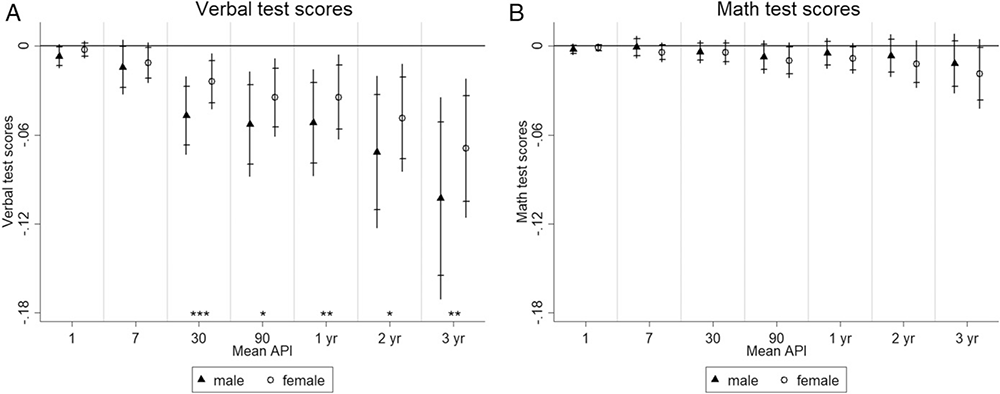Environmental pollution reduces human cognitive abilities

No one will argue with the fact that environmental pollution adversely affects human health and well-being. Various kinds of fine particles, harmful gases, including sulfur dioxide, are actively released during the combustion of combustible minerals in production and power plants. Pollutants harmful to all living organisms, including humans, extend to hundreds and thousands of kilometers.
A new study whose results were publishedmost recently, they show that pollution of our environment adversely affects human cognitive abilities. The work in question was carried out by scientists from Beijing Pedagogical University and Yale University. The authors of the study are Xing Yang and Xi Chen. Surprised that harmful substances adversely affect mental processes and memory, do not have to. Rather, it is surprising that such studies are rare.
The study is quite large, based on a compilation of data of 50,000 people who passed standardized tests to determine the level of cognitive abilities in 2010, and again - in 2014. The task of the researchers was to compare the test results of the same participants and try to understand how much the improvement or, on the contrary, the deterioration of the results is related to the state of the environment.
The sample of the research is quite representative; in addition, the database with the test results of the same participants is much more reliable than studying the test results of two different groups of participants. Tests include both math problems and verbal / language tests. In general, all this is very similar to the content of those tests that are used to determine the person's IQ. You need to find an extra element in the series, calculate the missing element of the progression, or perform some other similar task.
The date, time, and location of each test were recorded, so that researchers could correlate test results with the state of the environment, as mentioned above. The scientists' assumption was not difficult: if a person has been in adverse environmental conditions for a long time, then his mental abilities decrease over time. Just because the brain and the body as a whole are constantly affected by external negative factors.
According to the authors of the study, 4 years is sufficient time to find out whether environmental pollution affects a person’s cognitive abilities and, if so, how much.
The results were somewhat unusual. In summing up the results of the study, it turned out that the state of the environment does not seem to have a very clear effect on the cognitive abilities of a person. But this is only at first glance. In fact, the situation is somewhat different.

The results show a clear correlation between long-term air pollution and the dynamics of mental abilities of volunteers, especially in men.
In the short term, the changes are not too noticeable, but over time, the influence of the environment increases and the mental abilities really deteriorate. Changes in the results of verbal tests are most pronounced - with the mathematical tests, the situation is somewhat different, there are also changes here, but they are not so noticeable.
All of the above is important in the case, if you do not share the results of women and men. If, however, such a separation is done, then the situation will be different - the changes in the first and the second occur in different ways. As it turned out, women who live in a region with a significant level of pollution lose their ability to mathematical calculations faster than men. Conversely, men are more pronounced deterioration of "verbal" abilities.
The white matter of the brain is responsible for the verbal functions, which is largely defeated by the effects of the environment. But mathematical ability is already the “merit” of gray matter, to which pollutants have less impact.
By the way, statistical data can also be broken down by the age categories of volunteers, as well as by such an important attribute as the level of education. As it turned out, in older men with primary education, verbal abilities deteriorate to a significant degree - due to environmental pollution. The situation is somewhat different in the case of men of the same age category, but with a high level of education. The difference between the first and second is not so significant. But she is.
Researchers believe that their findings are incomplete, it is necessary to take into account a wider range of factors. By the way, now anaitic materials are often published, which show the economic damage of regions with a high level of air pollution, which is associated with the deterioration of the health status of the inhabitants of the region. But in a normal situation, we are talking about cardiovascular diseases, lung diseases and so on. But the results of studies with the calculation of losses from reduced mental abilities of people have practically not been published until now - there have either been no such studies or they are rare.
With regard to the deterioration of cognitive abilities, they are often a sign of such serious diseases as Alzheimer or Parkinson's disease. What kind of suffering such diseases cause to patients and their families is difficult to put into words, but in addition, there is also economic damage. The fact is that Alzheimer is the most "unprofitable" disease associated with a decrease in cognitive abilities. Every year it costs world health $ 226 billion and a deficit of 18 billion working hours.
Currently, such a factor as environmental pollution is practically not used when calculating and predicting the number of “cognitive” diseases and losses associated with them. Probably, the research scientists referred to in this article will help correct this omission.
Anyway, people living in places with a high level of pollution of the environment pay a very high price, to put it literally and figuratively.
PNAS , 2018. DOI: 10.1073 / pnas.1809474115
